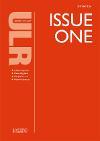Utilities Law Review - Volume 23 - Issue 1

Articles
The US Federal Trade Commission workshop on non-compete clauses
Richard J. Pierce, Jr
Lyle T. Alverson Professor of Law, George
Washington University
This article summarises a US FTC workshop that discussed non-compete clauses in employment contracts. A summary of the applicable law is followed by a discussion of
evidence suggesting that non-compete clauses are having serious effects on the performance of markets. It concludes with a discussion of the steps the FTC should
take to address the growing problems created by non-compete clauses
Predicting and forestalling market tipping
George Barker, Australian National University and Martin Cave, London School of Economics
The risk that a two-sided market with strong indirect network effects may tip into a monopoly is well known. The questions of whether this will happen in practice, whether
this creates problems, and if so what can be done to address those problems, are less well investigated. This article addresses these questions in relation to ride-hailing apps in the United Kingdom, also drawing on limited data observations in other countries. UK and other countries’ data show that the emergence of ride-hailing apps has had a major
effect on the wider marketplace, such entrants gaining substantial share in a growing marketplace. The data do not yet permit a firm conclusion as to the inevitability of
market tipping in ride-hailing, but the possibility remains. The article considers alternative regulatory measures which might be prepared or adopted against the possibility of such
tipping. These include revisions of existing regulation to reduce distortions in the wider marketplace; new interventions including enhanced data reporting; measures to prevent
dominant firms from injuring their rivals by such practices as requiring the single-homing of drivers; data-sharing; and price control
Utilities procurement: the state of play before Brexit
Christopher Bovis University of Hull
Utilities procurement resembles commercial procurement practices and its regulation provides many deviations from the Public Sector Procurement Directives. Utilities
procurement regulation is different from public sector procurement regulation and its development has taken a different path in the European legal integration. This path
adheres basically to the same principles but with notable exceptions and enhanced flexibility for utilities procurement. The exit of the the United Kingdom from the EU brings a
dilemma, whether to endorse a regime of three decades and follow its paradigm or create a new set of rules for entities which are operating in the utilities sectors
Case Comment
British Airways fined £20 million by ICO for failure to meet GDPR obligations
Roisin Cregan Solicitor, Macfarlanes LLP
In summer 2018, British Airways plc suffered a cyber breach, where an attacker gained access to BA’s systems and was able to divert customers away from BA’s website to its
own website, thereby obtaining their payment card information and other details. The Information Commissioner’s Office imposed a penalty on BA of £20 million for breaches
of its obligations to implement appropriate technical and organisational measures to ensure the security of the personal data it processes. The reasoning for this fine focuses
on BA’s negligent behaviour in failing to implement such measures, which should serve as a reminder to organisations to ensure that they have undertaken risk assessments and
implemented appropriate measures to protect the data they hold, and that they conduct regular reviews and testing to maintain those standards
EU Current Survey
Edited by Peter Alexiadis Gibson, Dunn and Crutcher LLP Brussels
Christoph Raab Wolf Theiss Rechtsanwälte GmbH & Co KG, Vienna
Energy
Telecommunications and Digital Economy
Transport
Telecommunications and Digital Economy
Transport
UK Current Survey
Edited by Philippa Young Solicitor, Oxford
Broadcasting
Energy
Postal Services
Telecommunications
Transport.
Energy
Postal Services
Telecommunications
Transport.
